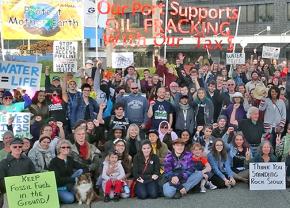Olympia stands in the way of fracking
reports on a protest at the Port of Olympia in solidarity with the protesters fighting fracking at Standing Rock, North Dakota.
ABOUT 250 protesters gathered at the Port Plaza adjacent to the Port of Olympia in Washington on October 22 to chant the message that "Mni Wiconi" (Water is life) and show, as their signs put it, that "Olympia stands with Standing Rock Sioux."
Approximately a month earlier, the port accepted a shipment of ceramic proppants destined for the Bakken oil fields in North Dakota. Ceramic proppants are materials used in the process of hydraulic fracturing, or "fracking." The proppants keep fracture created by fracking open, allowing oil and natural gas to be extracted.
In North Dakota, Native Americans have led a struggle to try to stop the Dakota Access Pipeline from being completed. The pipeline is designed to transport oil extracted from the Bakken fields more than 1,000 miles to Illinois.
As has usually been the case, Native people were prominent at the Olympia demonstration. Local groups were represented by Puyallup, Nisqually, Muckleshoot and Squaxin Island tribes and by the Quinault Indian Nation. However, the ceremonies were opened by a contingent of the Standing Rock Sioux activists fighting the battle against the Dakota Access Pipeline.

Organizer Sue Gunn told the crowd, "We need to stand with Native people in their efforts to protect water and our planet to have a future for our children and grandchildren."
Gunn is a former port commissioner who successfully led a fight to not build a warehouse at the port that was designed to hold fracking materials for trans-shipment. For that, she was forced out of her elected position on the excuse that she was not able to perform her duties while she was recovering from open-heart surgery.
ZOLTAN GROSSMAN, who facilitated the protest, pointed out that people who live in Pacific Coast ports can be the Achilles' heel of the oil export process. The path of destruction of Bakken crude oil begins at the fields in North Dakota, where the fracking takes place. Fracking has been associated with creating earthquakes and contaminating local water supplies with the chemicals that are used in the process, as well as being a huge draw on water resources themselves.
The oil that is bound for export to Asia is loaded into tank cars for transport by rail to Pacific Coast ports. The trains typically contain about 100 cars, most of which are outmoded and unsafe DT-111 tanker cars.
Bakken oil is very flammable, and derailments carrying it have caused several explosions in both the U.S. and Canada. An exploded train in Lac Megantic, Quebec, in 2013 killed 47 people. The latest derailment, in July of this year, was near Mosier, Oregon, which is right on the route to the Pacific Coast ports. Altogether, the trains travel through areas populated by approximately 44,000 people, 11,000 of which are children.
Of course, any exported oil will be burned along with other fossil fuels, exacerbating global warming.
However, oil produced through fracking cannot be extracted and exported if the ports refuse to accept materials needed for fracking and decline to build storage facilities to hold the cargo of the trains.
This provides the power that local activists have to disrupt the entire fracking process, and there have been some successes in wielding that power against both oil and coal storage facilities. Most recently, Shell Oil withdrew its application for an oil unloading facility in Anacortes, Washington. While the low worldwide price of crude oil no doubt had something to do with the decision, the protests that have been held in that area also have had an effect.
One speaker at the October 22 rally reminded people of the history of the popular actions at the Olympia port. In 2007, a large group of protesters battled police in the streets in an attempt to stop military vehicles from being transported from the port to the nearby Joint Base Lewis-McChord military base for repair and return to Iraq.
Today, activists are just as determined to make the port do the right thing.


